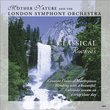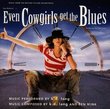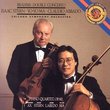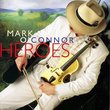| All Artists: Arnold Bax, David Lloyd-Jones, Royal Scottish National Orchestra Title: Bax: Symphony No. 2; November Woods Members Wishing: 0 Total Copies: 0 Label: Naxos Release Date: 6/22/1999 Genre: Classical Styles: Forms & Genres, Theatrical, Incidental & Program Music, Historical Periods, Modern, 20th, & 21st Century, Symphonies Number of Discs: 1 SwapaCD Credits: 1 UPC: 636943409329 |
Search - Arnold Bax, David Lloyd-Jones, Royal Scottish National Orchestra :: Bax: Symphony No. 2; November Woods
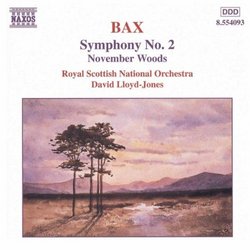 | Arnold Bax, David Lloyd-Jones, Royal Scottish National Orchestra Bax: Symphony No. 2; November Woods Genre: Classical
|
Larger Image |
CD DetailsSimilarly Requested CDs
|
CD ReviewsCompelling, passionate performances. David A. Hollingsworth | Washington, DC USA | 08/14/1999 (5 out of 5 stars) "Like the First Symphony of 1924, the Second Symphony portray the Sir Arnold Bax as the man who went through much of life's tragedies & misfortunes. The First World War, the Easter Uprising (when many of his friends were killed) as well as a number of personal problems & complexities took a toll upon the composer. It was not until 1930 that he began to see life in a more positive, peaceful mode (as expressed in his Third Symphony). There is no doubt that Bax was autobiographical in his musical essays.The Second Symphony is of a greater intensity & darkness than its predecessor: a work of upmost anguish & pessimism with a sense of comtemplation at the final bars. Even though there is a period of bright moments in the second movement, that is quickly overcome by a powerful climax that gave the movement the remaining moments the premonition of the lack of hope for a better, secured life. That lack of hope remains intacked for the rest of the symphony."November Woods" of 1917 is one of Bax's most evocative symphonic poems. The troubles in Ireland did not leave the composer's mind when he wrote the wrok. It has a mystical beginnning before passion & drama take over briefly. The music thereafter is gentle yet rough in spots until the mystical theme re-appears but with different instrumentation. A quiet end to the work maintained the its mysteriousness.The Second Symphony have been recorded in two occasions before this one under Naxos. Myer Fredman with the London Philharmonic Orchestra recorded the work under Lyrita LP by 1971 (and the recording is still in LP form). With the same orchestra, Bryden Thomson recorded this symphony under Chandos Recording Company by 1986. In terms of approaceability, tempo, passion, and emotional thrust, David Lloyd-Jones with the Royal Scottish National Orcheatra leans more toward Fredman. Both Fredman & Lloyd-Jones brought out the ruggedness of the work more effectively than did Thomson, who was more meticulous & grandeur in his overall reading of the score. Thomson, however, was no less passionate in his readings & his sense of refinement slightly outshine the abovementioned rivals. Also, the always atmospheric Chandos recording give more life to the sound than did the Naxos recording. The tam tam, cymbal clashes & the organ sound more fuller & alive in Chandos than in Naxos & the winds of the Royal Scottish played slightly out of tune in a couple of places."November Woods" was also recorded twice before the present Naxos recording. Sir Adrian Boult & the London Symphony recorded the work under Lyrita (re-issued into CD format) & Bryden Thomson recorded the work with the Ulster Orchestra (in Belfast, Ireland) under Chandos. Of the three recordings currently available, Sir Adrian Boult's recording outshined the other two in passion & excitement, with somewhat a greater sense of urgency & depictions. Lloyd-Jones performed with conviction & the same level of ruggedness as for the Second Symphony. The First prize, however, must go to Boult, with Thomson & Lloyd-Jones as close runner-ups. Naxos recordings are improving during the past few years, although some of the orchestras featured played in levels othan than first-rate. The Royal Scottish National Orchestra, however, played consistently first-rate, even under the helm of Sir Alexander Gibson & Neemi Jarvi. I look forward to more installments featuring Bax's works with the same artists under the same recording company with the affordable price.Recommended!!" Great music Hayward H. Siegel | East Meadow, New York United States | 12/17/2009 (5 out of 5 stars) "I must admit that I am a big fan of the music of Arnold Bax. I feel that he is one of the finest composers of the first half of the 20th Century, and it is hard to understand why his music is not more popular. His symphonies are brilliantly orchestrated;they are scored for large orchestras, with several percussion instruments. His 2nd Symphony follows this pattern. The score for this Symphony includes keyboard instruments, namely, piano, organ and celesta. The Symphony is in 3 movements. The 1st movement is the longest one, and the most dramatic one. There is a constant flow of tranquil and dramatic themes throughout the Symphony. November Woods is like other tone poems of Bax. They are well orchestrated and impressionistic. The orchestra paints a beautiful picture of the scene. Close your eyes, and you will get the impression that you are there, in the woods in November, experiencing the calm and stormy weather." The Symphonic Equivalent of a "The Dark Knight" Robert Burns | Royal Oak, MI USA | 02/26/2009 (5 out of 5 stars) "Arnold Bax is not well-known, but I think an argument can be made that he was the greatest symphonist of the 20th Century (not including Mahler). His stuff is densely structured, but always tuneful and full of color and drama.
His Second Symphony is the musical equivalent of a "Batman" film. No, seriously. It's a dark, Gothic piece filled with conflict, brooding, and longing. The opening of the first movement is all sinister bassoons and murmuring, angry strings with an initial ominous theme. The development is masterful - when you first listen to it - you may think, "Where is he going?" I encourage you to listen to it again, keep listening. Please listen for the return of certain themes. The final orchestral scream of the first movement is loud and anguished, but it makes sense, given what's gone before. The second movement is the haunted romance. It's lovely, but melancholy. About two-thirds of the way through, the drama escalates. But when it closes, you're in a moment of quiet, tragic beauty. The final movement takes us back to the conflict. The first part of the finale - in a pattern typical of Bax - is quick, dynamic, and reminiscent of a movie chase-and-fight scene. Things quiet down in the middle, and then there's the huge build-up to the final battle (an organ is used for maximum blast radius). Then, everything draws down to a mysterious whisper, the main theme gets repeated and passed on, quietly and more quietly.... until a final, hushed minor chord. Some people feel this is a problem, that the Second Symphony finds no resolution, except in the Third. I strongly disagree. The Second Symphony progresses logically. When it ends, it definitely ends. There is a sense that the conflict is over, it's taken a terrible toll, we see the destruction and feel regret but there's nothing left to do. This performance is great. I also listened to the Vernon Handley recording a few times, and really appreciated Handley's masterful sense of pacing; he keeps things at a brisk tempo but doesn't quash lyricism. However, Handley records with the BBC Orchestra, and I felt like I couldn't hear the bass instruments very well. That's a problem with Bax's Second, for this is a symphony full of omens and dark moments. Lloyd-Jones is no slouch; his interpretative approach is full of drama but is never sluggish (Bryden Thomson's Bax tempos are too much slogging for me). Best of all, you can hear the bassoons and the fortissimo roar at the end of the first movement raises the hair on the back of your neck! " |

 Track Listings (4) - Disc #1
Track Listings (4) - Disc #1
